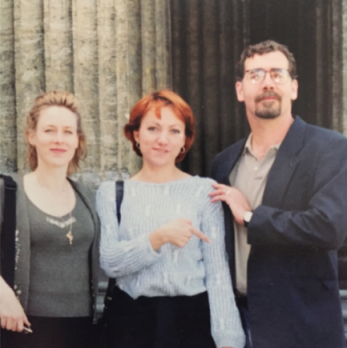Julie Stachowiak, PhD Activist, Scholar, and Patient Advocate
Johns Hopkins School of Public Health alumna and former member of the JHSPH faculty, epidemiologist Julie Stachowiak, PhD, dedicated her professional career to improving outcomes for those who suffer from multiple sclerosis, HIV, and healthcare associated infections. However, while her professional accolades and achievements were many, she was most proud of her role as a mother and wife.
Dr. Stachowiak passed away in April of this year at age 50, after a courageous battle with brain cancer. She was an infectious disease epidemiologist who received her doctoral degree from the Johns Hopkins Bloomberg School of Public Health, two master’s degrees in public health and international affairs from Columbia University, and an undergraduate degree from Rochester Institute of Technology.
Julie became an epidemiologist because she was passionate about a myriad of issues related to public health. She had extensive involvement in research and program implementation in Russia and the former Soviet Union, including work supported by the NIH, The Fogarty International Center, USAID and the Global Fund to Fight AIDS, TB, and Malaria. In 1993, she co-founded AIDS Infoshare Russia, with her great friend Alena Peryskina, an organization committed to lessening the suffering caused by HIV/AIDS and informing the international community about developments around HIV/ AIDS and human rights in Russia. While at Johns Hopkins Julie was a founding member of the School’s Center for Public Health and Human Rights, and worked closely with the Director, Professor Chris Beyrer, on health and rights research and training programs in Russia and Tajikistan.
She was known as a skilled and articulate activist who brought her passion to her research career. She served for many years on the Board of The Names Project, the steward of the iconic AIDS Memorial Quilt.
She spent her career advocating for others with a goal of improving the lives of the people around her. Prior to defending her doctorate at JHSPH, Julie was diagnosed with multiple sclerosis (MS). She attacked the disease with tenacity and passion. Her intellect and humor – and willingness to share her knowledge with others living with MS were remarkable. She became an internationally recognized MS columnist for About.com and wrote two books (The MS Manifesto and The Diabetes Manifesto).
Julie was conducting public health interventions and research overseas with her husband, Dr. Mark Stibich, also a JHSPH alumnus, when they learned of air disinfection technology being used to combat airborne tuberculosis. Recognizing that the technology, with significant adaptations, had the potential to solve a major global health issue – Healthcare Associated Infections -- they began evaluating its efficacy and potential for commercial applications. They co-founded Xenex Disinfection Systems in 2008 with the mission to destroy the pathogens that cause infections that impact the health and lives of millions of patients and their families, and become the new standard method for disinfection in healthcare facilities worldwide. At Xenex, Julie played a significant role in R&D while overseeing research design and analysis, and grant applications, frequently in conjunction with hospitals using Xenex technology. Julie’s insight and strategic thinking played a significant role in the company’s success, and her hard work continues to enhance patient safety worldwide.
Julie’s contributions to mankind and to science were many, but those who knew her know that she considered her greatest achievements to be her twin daughters and her partnership with her husband, Dr. Mark Stibich. Family time was the most important time for Julie, and she never lacked for humorous stories about the twins’ latest proclivities. In her spare time, Julie enjoyed creating art and one of her pieces is on permanent display at the Museum of Encaustic Art (Santa Fe, New Mexico).
The week of her passing two landmark papers on updated MS treatment guidelines from the American Academy of Neurology were published in Neurology. Julie was a co-author on both.

